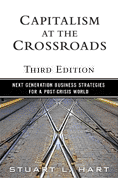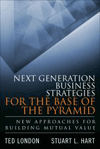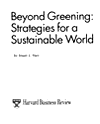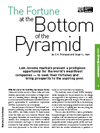1. Integrating Sustainability into Strategy
For the past two decades, “sustainability” strategies have focused on eco-efficiency, stakeholder engagement, and social responsibility in existing core businesses. Now companies
are being challenged to move “beyond greening” to develop breakthrough innovations that
confront directly the two biggest problems facing humanity: growing inequity and accelerating
environmental degradation. The challenge—and the opportunity—is to harness technological
and business model innovation to create new growth platforms that actually regenerate the
environment and lift the base of the income pyramid—while growing and earning a profit.
This one-day workshop for executive teams develops a framework enabling a constructive discussion about how best to incorporate the emerging challenges associated with sustainability into core business strategy. Using our Sustainable Value Framework, participants first chart the company’s current sustainability “portfolio.” This allows for a clear understanding of the current reality. Next, participants identify gaps and develop specific strategies and priorities for next steps. The result is a common understanding of how best to integrate the challenges of sustainability into strategy and a set of action items for the future.

In this one-day session, participants learn how to:
Map the terrain: Assess the current state of the business using a sustainable value framework;
Move beyond greening: Implement sustainability strategies that go far beyond incremental eco-efficiency and social responsibility;
Develop inclusive businesses: Embed the enterprise in the local context to serve the underserved at the “base of the pyramid” (BoP);
Take the “green leap”: Incubate clean technologies first in the BoP through “reverse innovation;”
Organize for sustainable growth: Make sustainable growth strategies work in a short-term world.
2. BoP as a Business Opportunity
The Base of the Pyramid (BoP) is a socio-economic designation for the billions of people living on less than $4 a day. It is also a business strategy that focuses on products, services and enterprises to serve this demographic in a way that is culturally sensitive, environmentally sustainable and economically profitable.
Companies who choose to serve these markets will join a unique group of bold visionaries that not only embrace a new brand of corporate social responsibility, but will experience a new mode of growth and profitability.
This one-day workshop for executive teams develops a framework for incorporating BoP into corporate innovation and competitive strategy. BoP strategy includes not only innovative approaches for serving the underserved and creating new markets, but also imaginative ways to drive growth and profits through reverse or “trickle up” innovation.
Existing “shelf” technologies have the potential to be repurposed into new businesses built from the bottom up.
Using the BoP Readiness Assessment Framework, participants analyze a company’s relevant
capabilities, technologies, products, and services and assess their potential to meet the
emerging needs of underserved people and communities in geographies relevant to the
company. Participants also identify gaps and develop specific strategies and priorities for next
steps. The result is a common understanding of how to develop a BoP business development
strategy and a set of action items for the future.
In this one-day session, participants learn how to:
- Frame BoP as part of corporate innovation strategy.
-
Assess the company’s relevant capabilities using the BoP Readiness Assessment Framework;
-
Understand the potential of existing “shelf” technologies, products, and services to meet emerging needs.
3. Corporate Sustainability Assessment
This is an assessment of your company’s overall positioning on sustainability, using the Sustainable Value Framework developed by Stuart Hart and his colleagues over the past two decades. Using a combination of interviews, stakeholder mapping and interactive workshops involving functional and business executives, we first inventory a company’s current sustainability “portfolio.” This includes an inventory of the most promising disruptive clean technologies for possible incubation and commercialization. We then work with the leadership team to assess gaps in the company’s sustainability strategy and develop new strategic initiatives, especially those focused on clean technology and BoP.
Gaps in knowledge, skill, and capability are noted and appropriate training, education, and capacity-building initiatives are developed.
 4. Base of the Pyramid Readiness Assessment
4. Base of the Pyramid Readiness Assessment
The Base of the Pyramid (BoP) is a socio-economic designation for the billions of people living on less than $4 a day. It is also a business strategy that focuses on products, services and enterprises to serve this demographic in a way that is culturally sensitive, environmentally sustainable and economically profitable.

Companies who choose to serve these markets will join a unique group of bold visionaries that not only embrace a new brand of corporate social responsibility, but will experience a new mode of growth and profitability.
Based upon our extensive experience over the past decade in both launching and analyzing BoP ventures, ESW assesses a company’s overall readiness to mount a BoP business development strategy. Through interviews with key executives and staff, we analyze a company’s relevant capabilities, technologies, products, and services and assess their potential to meet the emerging needs of underserved people and communities ingeographies relevant to the company. Gaps are noted and appropriate training, education, and capacity-building initiatives are developed.
 5. Hart Survey of Sustainability
5. Hart Survey of Sustainability
To accelerate the change process, it is important to assess where employees and executives stand regarding the integration of sustainability into their thinking. In partnership with Denison Consulting, ESW is developing the “Hart Survey of Sustainability”: A tool to help companies “take the organizational pulse” related to their corporate sustainability climate. Intended for use by corporate and business leaders, the SOS asks managers and employees to rate their agreement with statements describing the organization’s approach to sustainable business.
Survey results and feedback spur discussion, training and development programs and other interventions necessary to motivate corporate change.
 6. Sustainable Value Laboratory
6. Sustainable Value Laboratory
ESW uses interactive strategy games to simulate the challenges posed by sustainability to prepare executives and employees for the realities they will face in pursuing “beyond greening” strategies. ESW has developed games and interactive exercises to help companies build a shared understanding of the emerging challenges, thereby facilitating the effective incorporation of sustainability into competitive strategies.
Transformation: The Sustainable Enterprise Game. Designed by Stuart Hart and Susan Svoboda of the Realia Group, the Transformation Game enables participants to experience the challenges of pursuing sustainability-based strategies under competitive conditions. In this full-fledged business strategy “laboratory,” individuals take on executive management roles within their companies. Each team defines its own strategy under life-like conditions which include time pressures, budgetary constraints, unpredictable stakeholder interventions, changing market conditions and limited information. The team’s performance (impact on P&L, Balance Sheet and Environmental and Social Reports) is scored and benchmarked against computer-simulated firms. The goal is to shorten the feedback loop and provide reliable results in a “safe” environment prior to firms risking capital on live sustainable enterprise initiatives.
Crossroads: The BoP Game. This strategy game assists corporations in building the internal capabilities required to effectively launch business ventures in Base of the Pyramid environments. The goal is to train a cadre of skilled and motivated members in an organization to become BoP project team members and leaders. ESW is working with JacGeurts, Twynstra Gudde Management Consultants, Tilburg University, and some of the world’s leading “gamers” to develop the product.
7. Competitive Imagination Laboratory
New, sustainable businesses are best created through an approach that engages local community members and other “fringe” stakeholders in the development of creative new business concepts. To do so, ESW, with Sanjay Sharma, works with companies to engage stakeholders with diverse perspectives for the purposes of generating “competitive imagination.” This capability reflects the corporation’s ability to:
- Engage in deep dialogue with underserved communities and radically differing perspectives
- Co-develop new business opportunities and models embedded in the local, cultural context
- Co-create and launch new businesses and markets that generate mutual value for all partners
- Build a foundation for innovating disruptive, clean technologies
Unique and disruptive business ideas often lie beyond an organization’s existing set of core constituencies, with “fringe” stakeholders (see below).

 To discover the next great profitable innovation, companies must therefore extend the firm’s boundaries and tap into the knowledge and perspectives of those who may have little, or no prior connection to them. Listening to and learning from underserved or ignored populations not only brings powerful insight, but can yield transformative results. Dipping into the same well of stakeholders does little to spark corporate imagination or produce the highly prized disruptive innovation. But going to the edge (where few, including your competitors go) and harnessing “radical” perspectives from the outside, will not only build your innovative potential bottom line, but build better, more hopeful lives.
To discover the next great profitable innovation, companies must therefore extend the firm’s boundaries and tap into the knowledge and perspectives of those who may have little, or no prior connection to them. Listening to and learning from underserved or ignored populations not only brings powerful insight, but can yield transformative results. Dipping into the same well of stakeholders does little to spark corporate imagination or produce the highly prized disruptive innovation. But going to the edge (where few, including your competitors go) and harnessing “radical” perspectives from the outside, will not only build your innovative potential bottom line, but build better, more hopeful lives.
Engaging with populations who can help you unleash competitive imagination requires unique skills that ESW has honed for many years.
Our global team can help a corporation:
>> Broaden the “corporate bandwidth” by exposing executives, technologists, and new product developers to problems—and opportunities—they never imagined before.
>> Fire the imagination by engaging in deep dialogue with underserved communities and stakeholders with radically different perspectives.
>>
Build a new foundation for launching innovative disruptive, clean technologies.
>>
Incubate radical innovations and new business models.
8. BoP Protocol: Business Co-creation
ESW has been centrally involved in the development and application of a specific approach to BoP business co-creation premised on generating competitive imagination: The BoP Protocol.
The BoP Protocol provides a structured process for enterprise and market co-creation through which companies build grassroots business partnerships with BoP entrepreneurs and communities.

By bringing together companies and BoP communities in equitable, mutually beneficial partnerships, the BoP Protocol enables the creation of new businesses, capabilities, and markets that neither set of partners could have developed on their own.

The Base of the Pyramid Protocol seeks to develop a new business process that enables corporations to partner with BoP communities in co-developing sustainable, economically viable businesses that serve the communities’ needs and aspirations.
The process begins with the selection of appropriate BoP project sites, the formation and training of a multi-disciplinary corporate field team, and the selection of local community partners.
Once this is completed, there are three phases:
- Phase I – Opening Up
- Phase II – Building the Ecosystem
- Phase III – Enterprise Creation
The following case studies are BoP action learning projects developed using our Base of the Pyramid Protocol.
For details on the BoP Protocol methodology and its application, visit www.bop-protocol.org.
9. BoP Global Network

The BoP Global Network was established to bring together global leaders to share knowledge and disseminate information regarding the theory and practice of sustainable business at the base of the economic pyramid. Rather than using traditional aid methodologies to help the poor and improve their quality of life, ESW has established BoP Learning Labs that promote research and development of entrepreneurial business methods. These Labs make up the BoP Global Network. The goal is to stimulate new enterprises that are economically competitive, environmentally sustainable, and culturally appropriate. This innovative idea has caught the attention of numerous academic institutions and other organizations around the world. Currently, 26 BoP Learning Labs have been established in 23 countries.
To qualify as a BoP business there must be these four factors present:
- A focus on private-sector business
- Businesses must be transformational in quality. They must build local capacity and generate livelihoods, and the business must engage members of the local community as partners.
- There must be a consideration of environmental, social and cultural impacts imbedded in the strategy.
- There must be the potential to scale and propagate the business beyond the initial community
The first BoP Learning Lab began in the US as a consortium of companies, NGOs, entrepreneurs, multilateral organizations, and academics working to discover and implement business solutions to global poverty. Established in 2000, it grew out of the research and writings of Dr. Stuart Hart in the late 1990s.Today, the Labs represent a vibrant community of academics and practitioners in 18 countries that engage in knowledge creation and dissemination about the theory and practice of creating sustainable businesses at the base of the economic pyramid.
The BoP Global Summit is an annual event that brings together entrepreneurs and corporate innovators to discuss the challenges and opportunities of creating business enterprises at the base of the pyramid. The Summit is an extraordinary networking and learning event that focuses on pushing the boundaries of BoP businesses by highlighting innovative clean technology products and inclusive business models for the base of the pyramid. The Summit is an event where participants are actively involved in accelerating the transformational change required to become a truly sustainable enterprise.
--- ---










